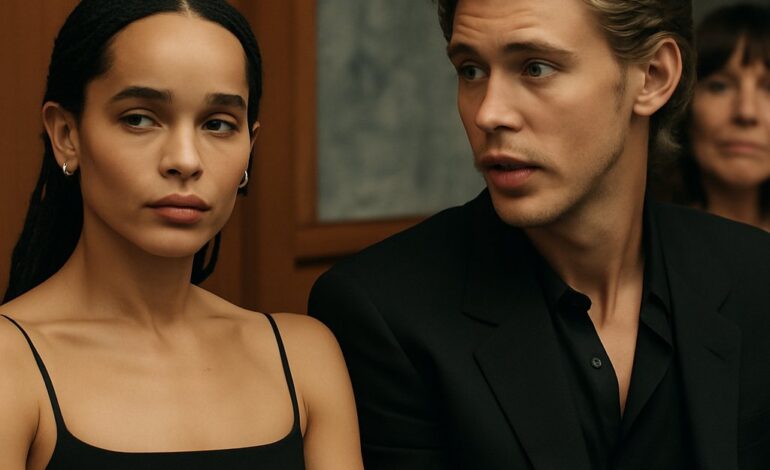Zoe Kravitz says “neither” to SATC spinoffs, unintentionally snubs Austin Butler’s The Carrie Diaries

During a playful Vanity Fair lie detector segment, Zoë Kravitz dismissed both Sex and the City spinoffs with a single word, “Neither,” unaware she had just iced The Carrie Diaries while seated next to one of its stars, Austin Butler.
I am Zoe Bennett, your guide to what happened, why it matters, and the context that keeps the facts front and center. Here is the breakdown with clear sourcing and measured analysis.
Kravitz, 36, and Butler, 34, were promoting their new project when Vanity Fair asked which spinoff is better, the CW prequel The Carrie Diaries or Max’s And Just Like That. Kravitz did not hedge. “Neither. Leave that show alone. Everybody just stop,” she said, a crisp verdict that landed with extra sting once Butler quietly revealed he had played Sebastian Kydd, teen Carrie Bradshaw’s love interest, on The Carrie Diaries in 2013 and 2014. In a lighthearted reaction, Butler casually tossed aside a couple of printed sheets and joked, “I’m gonna throw this guy out. And this guy out,” before explaining they were photos of him from the CW series. Kravitz, surprised, dropped her gaze and apologized. “Okay, sorry. Didn’t know that.” The tester confirmed she was telling the truth about not realizing Butler’s connection to the show, prompting her quick “Oops.”
The exchange doubled as a compact history lesson. The Carrie Diaries aired for two seasons from 2013 to 2014 on the CW, centering on an 80s-era, high school version of Carrie Bradshaw, played by AnnaSophia Robb, with Butler as the brooding on-again, off-again boyfriend. Its adult-era counterpart, And Just Like That, launched in 2021 with Sarah Jessica Parker, Cynthia Nixon, and Kristin Davis returning to the Sex and the City universe alongside a new ensemble. That series concluded its run on August 14 after three seasons, with creator Michael Patrick King clarifying that it was a choice to stop at a story peak, not a cancellation.
Kravitz did not let And Just Like That off gently. Asked by Butler if she felt relieved the series wrapped, she replied that she had mixed feelings. Then came a sharper critique: she flagged what she called a “bats–t” narrative choice, recalling a plot where Aidan (John Corbett), Carrie’s long-distance boyfriend, breaks Carrie’s vintage window during a surprise visit, and the episode pivots into a quest to replace the pane. “There were plotlines that confused me more than others,” she said. “Like the window. What was up with the window?” When Butler volunteered, “I liked Aidan,” Kravitz quipped, “You don’t anymore.”
The candid take tracks with comments Kravitz made earlier in the week during an “Are You Okay?” segment in which she half-joked that her late-night anxiety toggles between mortality and bewilderment over And Just Like That. “It’s a combination of death and And Just Like That,” she said, describing the mental soundtrack as “I’m going to die” followed by “And Just Like That, what happened there?”
Meanwhile, the discourse swirling around And Just Like That reached the top of the pyramid. Sarah Jessica Parker told The Guardian in June that she was surprised to learn how much online criticism was directed at the character Che Diaz, played by Sara Ramirez in the first two seasons. A friend had to flag the negative chatter for Parker, who said she rarely engages with peripheral commentary after five decades in the business. Ramirez exited after season two, a pivot that arrived alongside broader creative recalibrations in season three.
From a media-analysis vantage point, the Kravitz Butler moment illustrates a few useful realities about legacy franchises. First, star commentary now operates as a public focus group, often amplifying debates that longtime viewers have already been having. Second, prequels and sequels live under different expectations. The Carrie Diaries was a teen prequel on broadcast television, shaped by CW norms of the early 2010s, while And Just Like That was prestige streaming with a legacy audience and enormous nostalgia pressure. Holding them to the same standard invites friction, which is partly why Kravitz’s blunt “neither” landed with such electricity in the clip.
It also highlights the durability of Sex and the City as a cultural industry. Between its original HBO run, the films, the CW prequel, and the recent Max series, viewers have spent more than two decades revisiting Carrie’s world. Even as And Just Like That signs off, King’s statement suggests the creative team aimed to stop on their own terms, not because interest vanished. The intensity of the conversation around plotlines and character arcs, for better or worse, is evidence of a franchise that still provokes strong reactions across generations.
Bottom line, the tea was spilled on camera, and the receipts are simple. Kravitz dismissed both spinoffs, unknowingly snubbed Butler’s own series, then owned the miss. Butler took it in stride. The broader conversation about what worked, what did not, and what audiences still want from the Sex and the City universe continues, even after the latest chapter has closed. Consider that your culture check for the week. And yes, we will be watching to see who comments next.
That wraps up today’s analysis. Stay informed, stay critical, and follow the facts.
Sources: Celebrity Storm and New York Post, Vanity Fair, The Guardian, The CW
Generated by AI




